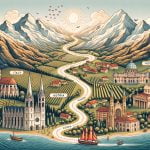Italy and Austria are two stunning European countries that offer a wealth of cultural and natural treasures for travelers to explore. From the historic cities of Rome, Florence, and Venice to the majestic beauty of the Austrian Alps, this journey from Italy to Austria promises a memorable adventure.
Italy, known for its rich history, art and architecture, and delicious cuisine, is a popular destination for tourists around the world. The country’s diverse landscapes stretch from picturesque coastlines along the Mediterranean Sea to rolling hills dotted with vineyards and olive groves. In contrast, Austria boasts some of Europe’s most breathtaking Alpine scenery, charming village towns, and vibrant cities like Vienna and Salzburg.
When planning your trip from Italy to Austria, it is crucial to consider the best time to visit. Both countries enjoy mild summers and cold winters, so travelers often prefer visiting during spring or autumn when the weather is pleasant and tourist crowds are relatively smaller. Each season brings its own unique charm – spring showcases blooming flowers, while autumn paints the landscapes in vibrant hues of red and gold.
In this article series, we will guide you through planning an unforgettable journey from Italy to Austria. We will offer recommendations on must-visit destinations in Italy such as Rome with its ancient ruins and Vatican City with its iconic St. Peter’s Basilica. Then we will delve into exploring the cultural gems of Vienna in Austria, followed by venturing into the stunning Alps for an enchanting journey through the Austrian countryside.
Along the way, we will also uncover hidden gems off-the-beaten-path stops that showcase lesser-known but equally charming aspects of these two beautiful countries. Join us as we provide practical tips for a seamless travel experience from Italy to Austria.
Best time to travel from Italy to Austria
Italy and Austria are two countries that are closely connected geographically, making it convenient for travelers to explore both destinations in one trip. When planning your travel from Italy to Austria, it is important to consider the best time to visit in order to make the most out of your journey.
Spring and Fall: Ideal Seasons for Exploring Italy and Austria
The spring months of April and May, as well as the fall months of September and October, offer pleasant weather conditions with mild temperatures and fewer crowds. This makes it an ideal time to travel from Italy to Austria. During these seasons, you can expect blossoming landscapes, blooming flowers, and lush greenery.
In Italy, cities like Rome, Florence, and Venice are known for their art, architecture, and rich history. Springtime offers comfortable temperatures for exploring these cities on foot or by cycling through picturesque neighborhoods. Similarly, in Austria’s capital city of Vienna, the beautiful parks and gardens come alive during springtime with colorful flowers in full bloom.
During fall months in both Italy and Austria, you can witness the stunning autumn foliage as the landscapes transform into vibrant shades of reds, oranges, and yellows. This is a perfect time to enjoy outdoor activities such as hiking or biking in the countryside.
Summer: Peak Season with Vibrant Festivals
If you prefer warmer temperatures and enjoy lively festivals and events, traveling from Italy to Austria during the summer months of June to August would be ideal. The weather is typically sunny with longer days allowing for more exploration time.
In both countries, summer brings a plethora of cultural events such as open-air concerts, food festivals, and street performances. In Italy’s cities like Rome or Naples along the coastlines or popular destinations like Tuscany or Amalfi Coast offer a vibrant atmosphere perfect for enjoying beach vacations or exploring historical sites.
Similarly in Austria during summertime tourists flock to the picturesque Salzkammergut region, a popular lake district known for its stunning landscapes and beautiful lakes. The Salzburg Festival, held in July and August, offers world-class opera performances in the birthplace of Mozart. Vienna also hosts numerous musical events and outdoor concerts during summer months.
Whether you choose to travel during the spring, fall, or summer seasons, both Italy and Austria offer a wide array of experiences. It is important to consider your personal preferences for weather and activities when deciding on the best time to travel from Italy to Austria.
Planning your itinerary
Italy is a country filled with breathtaking destinations that offer something for everyone. Whether you’re seeking art and history in Florence, the ancient ruins of Rome, or the romantic canals of Venice, Italy has it all. When planning your itinerary from Italy to Austria, it’s essential to include some must-visit destinations in Italy.
- Rome: Start your Italian adventure in the capital city of Rome. Explore iconic landmarks like the Colosseum, Vatican City, and the Trevi Fountain. Indulge in delicious Italian cuisine while strolling through narrow streets lined with charming cafes and gelaterias.
- Florence: Known as the birthplace of the Renaissance, Florence is a must-visit destination for art enthusiasts. Marvel at world-renowned works of art at the Uffizi Gallery and visit the magnificent Duomo. Don’t forget to take a leisurely walk along Ponte Vecchio, a bridge lined with jewelry shops.
- Venice: No trip to Italy would be complete without a visit to Venice. Experience the enchantment of this unique city as you glide along its famous canals on a gondola ride. Explore St. Mark’s Square and take in the stunning views from Rialto Bridge.
Including these destinations in your itinerary will ensure an unforgettable experience in Italy before heading to Austria. Each city offers its own distinct charm and attractions that will leave you wanting more.
Traveling from Italy to Austria by train
When it comes to traveling from Italy to Austria, one of the most enjoyable and convenient options is taking a train. The train journey not only offers stunning views of the picturesque countryside but also provides a comfortable and efficient way to travel between these two countries. Here are some tips and recommendations for a smooth train journey from Italy to Austria.
- Choose the right train route: There are several train routes that connect major cities in Italy with popular destinations in Austria. The most common route is from Venice, Italy to Vienna, Austria, which offers a direct connection between these two vibrant cities. Another popular route is from Milan, Italy to Salzburg, Austria, which allows you to experience the beauty of both countries.
- Book your tickets in advance: To secure the best fares and seating options, it is advisable to book your train tickets in advance. You can easily book your tickets online through various railway websites or through travel agencies. By doing so, you can also avoid long queues at the ticket counters and ensure a hassle-free journey.
- Consider purchasing a rail pass: If you plan on visiting multiple destinations within both Italy and Austria, it might be worth considering purchasing a rail pass. Rail passes offer unlimited travel within a specific duration and can save you money compared to buying individual tickets for each leg of your journey. Additionally, they provide flexibility as you can hop on and off trains freely.
- Be mindful of luggage restrictions: When packing for your train journey, keep in mind that there may be luggage restrictions on certain trains. It is advisable to pack lightly or check if there are any specific guidelines regarding luggage size and weight before boarding the train.
- Enjoy the scenic ride: One of the highlights of traveling by train from Italy to Austria is the breathtaking scenery along the way. From rolling hillsides dotted with vineyards to snow-capped peaks of the Alps, make sure to grab a window seat and take in the panoramic views. Don’t forget to have your camera ready for some memorable snapshots.
By following these tips and recommendations, you can make the most of your train journey from Italy to Austria. Sit back, relax, and enjoy the convenience and beauty that this mode of transportation offers as you venture from one captivating country to another.
Exploring the cultural gems of Vienna, Austria
Vienna, the capital city of Austria, is known for its rich cultural heritage and vibrant arts scene. As one of Europe’s cultural hubs, Vienna offers visitors a plethora of cultural gems to explore. From historic architecture to world-class museums, here are some must-visit destinations in Vienna.
One of the most iconic landmarks in Vienna is the Schönbrunn Palace. This Baroque palace and its stunning gardens are a UNESCO World Heritage Site. Visitors can explore the lavish rooms of the palace, stroll through the beautiful gardens, and even watch performances at the Orangery. Another architectural masterpiece is St. Stephen’s Cathedral. This Gothic cathedral is one of the most important symbols of Vienna and offers breathtaking views from its tower.
Art enthusiasts will find plenty to love in Vienna. The MuseumsQuartier is home to several world-renowned museums including the Leopold Museum, which houses an impressive collection of modern Austrian art, and the Kunsthistorisches Museum, known for its extensive art collections spanning various periods and regions. Additionally, music lovers should not miss a visit to the Vienna State Opera or attend a classical concert at one of the city’s many renowned venues.
For those interested in history and Austrian culture, a visit to Hofburg Palace is a must. This former imperial palace showcases opulent rooms such as the Imperial Apartments and Silver Collection. The nearby Albertina Museum also offers an array of art collections and exhibits covering everything from Renaissance masterpieces to contemporary works.
Overall, Vienna is a treasure trove for those seeking cultural experiences. With its stunning architecture, world-class museums, and deep-rooted history, this city has something to offer every traveler.
| Destination | Main Attractions |
|---|---|
| Schönbrunn Palace | Lavish palace rooms, beautiful gardens |
| St. Stephen’s Cathedral | Gothic cathedral with breathtaking views |
| MuseumsQuartier | Leopold Museum, Kunsthistorisches Museum |
| Hofburg Palace | Imperial Apartments, Silver Collection |
| Albertina Museum | Exhibits covering various art periods and styles |
Venturing into the stunning Alps
The stunning Alps span across several countries, including Austria. A journey through the Austrian countryside offers travelers breathtaking views, picturesque landscapes, and a chance to immerse themselves in the beauty of nature. Whether you are an outdoor enthusiast or simply seeking a peaceful escape, exploring the Austrian Alps is a must during your trip from Italy to Austria.
Outdoor Adventures in the Alps
One of the main attractions of the Austrian countryside is its vast range of outdoor activities. In summer, hikers and mountain bikers flock to the region to explore its numerous trails that lead through valleys, meadows, and up to majestic peaks.
The Hohe Tauern National Park is particularly popular among nature enthusiasts as it offers a wide array of hiking routes for all levels of expertise. Visitors can admire cascading waterfalls, spot wildlife such as ibex and chamois, and enjoy the tranquility of alpine meadows.
In winter, the Austrian Alps transform into a winter wonderland perfect for skiing and snowboarding. The ski resorts in regions like Tirol and Salzburg attract visitors from around the world with their well-groomed slopes, state-of-the-art facilities, and charming alpine villages. Whether you are a beginner or an experienced skier, there are plenty of options for everyone to enjoy this winter sport.
Idyllic Alpine Villages
A journey through the Austrian countryside will take you to idyllic alpine villages that seem straight out of a storybook. These villages offer a glimpse into traditional Austrian life and provide a peaceful retreat away from the bustling cities.
Places like Zell am See-Kaprun in Salzburg or Hallstatt in Upper Austria are known for their charming architecture, colorful houses adorned with flower boxes, and stunning lake views. Exploring these villages on foot allows visitors to soak in their unique atmosphere while also visiting local shops selling authentic handicrafts and tasting traditional cuisine.
Scenic Drives
For those who prefer to enjoy the beauty of the Austrian countryside from the comfort of a car, there are several scenic drives that offer breathtaking views. The Grossglockner High Alpine Road is one such route that winds through the heart of the Hohe Tauern National Park. This panoramic road takes drivers through stunning landscapes, past glaciers, and offers sweeping vistas of snow-capped peaks.
Another renowned drive is the Romantische Straße (Romantic Road) which stretches from Tirol to Lower Austria. This picturesque route takes travelers through charming villages, medieval castles, and lush green valleys.
Venturing into the stunning Alps in Austria is an unforgettable experience that allows travelers to connect with nature and explore some of Europe’s most beautiful landscapes. Whether you choose to hike, ski, or simply drive through this breathtaking region, the Austrian countryside offers something for everyone.
Delving into the culinary delights of Italy and Austria
In this section, we will explore the culinary delights that await you on your journey from Italy to Austria. Both countries offer a diverse range of dishes deeply rooted in their respective cultures and traditions. Whether you’re a fan of pasta and pizza or indulge in hearty Alpine cuisine, your taste buds are in for an unforgettable experience.
Italy is renowned worldwide for its culinary contributions, and it’s no surprise that Italian cuisine features prominently on any traveler’s itinerary. From the bustling streets of Rome to the romantic canals of Venice, each region offers its own specialties and flavors.
Indulge in the classic pasta dishes like spaghetti carbonara or tagliatelle al ragù, or savor the simple yet delicious flavors of a Margherita pizza. Don’t forget to try gelato, Italy’s beloved frozen treat, and pair it with a strong cup of espresso for the ultimate culinary experience.
As you venture into Austria, prepare yourself for a delightful explosion of flavors influenced by its rich cultural heritage. Austrian cuisine strikes a perfect balance between comfort food and refined delicacies. One cannot miss trying Wiener Schnitzel, a breaded and pan-fried veal escalope that has become synonymous with Austrian cuisine.
Another must-try dish is Tafelspitz, boiled beef traditionally served with various accompaniments such as horseradish sauce and apple-horseradish compote. And be sure not to leave Austria without sampling Sachertorte, a delectable chocolate cake layered with apricot jam.
Both Italy and Austria boast thriving wine cultures that contribute greatly to their culinary scenes. In Italy, you’ll find some of the world’s finest wines produced in regions such as Tuscany (known for Chianti) and Piedmont (famous for Barolo).
Meanwhile, Austria is known for its white wines made from grape varieties like Grüner Veltliner and Riesling. Be sure to enhance your dining experience by pairing your meals with the perfect glass of wine, as the local flavors complement each other harmoniously.
So, embrace the gastronomic delights of Italy and Austria on your journey. From classic Italian dishes to hearty Austrian cuisine, your culinary adventure will leave you with a deep appreciation for the diverse flavors and traditions that these two countries bring to the table. Bon appétit and guten Appetit.
Hidden gems along the way
Italy and Austria are two stunning countries with rich histories, diverse cultures, and breathtaking landscapes. While many travelers flock to the well-known cities and attractions in both countries, there are also plenty of hidden gems along the way that offer a more off-the-beaten-path experience.
One such hidden gem is the town of Hallstatt in Austria. Situated in the Salzkammergut region, Hallstatt is known for its picturesque setting, with pastel-colored houses nestled against the backdrop of majestic mountains and a crystal-clear lake.
It is also home to one of the world’s oldest salt mines, which can be explored through guided tours. Visitors to Hallstatt can take leisurely strolls along its charming streets, admire its beautiful architecture, or simply relax by the lake and soak in the peaceful atmosphere.
Another off-the-beaten-path destination is Verona, Italy. Best known as the setting of Shakespeare’s Romeo and Juliet, Verona offers a mix of Roman ruins, medieval architecture, and Renaissance art.
The city’s highlights include the Verona Arena, a well-preserved Roman amphitheater that hosts opera performances during the summer months; Juliet’s House with its famous balcony; and Piazza delle Erbe, a bustling square surrounded by colorful buildings and historic landmarks. Verona also serves as a gateway to the nearby Valpolicella wine region, where visitors can indulge in wine tastings among vineyards overlooking rolling hills.
For nature enthusiasts looking for an escape from urban life, consider stopping at Lake Garda on your way from Italy to Austria. Located between Milan and Venice, Lake Garda is Italy’s largest lake and offers a wide range of outdoor activities such as hiking, biking, sailing, and windsurfing. Picturesque towns surround the lake providing visitors with charming lakeside promenades lined with cafes serving local delicacies like fresh seafood or authentic Italian gelato.
To ensure you don’t miss out on these hidden gems, it’s important to plan your itinerary accordingly and allocate enough time to explore these off-the-beaten-path stops. Whether you’re seeking historical sites, natural wonders, or cultural experiences, these hidden gems along the way from Italy to Austria are sure to provide unique and memorable travel experiences.
| Hidden Gem | Description |
|---|---|
| Hallstatt, Austria | A picturesque town known for its stunning mountain and lake views, as well as one of the world’s oldest salt mines. |
| Verona, Italy | A city famous for its Roman ruins, medieval architecture, and connections to Shakespeare’s Romeo and Juliet. |
| Lake Garda, Italy | Italy’s largest lake offering a range of outdoor activities such as hiking, biking, sailing, and windsurfing. |
Practical tips for a seamless travel experience from Italy to Austria
In conclusion, traveling from Italy to Austria can be an unforgettable journey filled with cultural experiences, stunning landscapes, and delicious cuisine. To ensure a seamless travel experience, it is important to consider some practical tips.
Firstly, the best time to travel from Italy to Austria is during the shoulder seasons of spring and fall. During these times, the weather is pleasant and there are fewer crowds. Additionally, planning your itinerary beforehand is essential. Italy offers a wide range of must-visit destinations such as Rome, Florence, Venice, and Milan. Take the time to explore these cities and immerse yourself in their rich history and art.
When it comes to traveling from Italy to Austria, taking the train is highly recommended. Trains are comfortable and convenient, allowing you to sit back and enjoy the scenic views along the way. Make sure to book your tickets in advance and consider purchasing a rail pass for flexibility. It is also advisable to bring some snacks or food with you for longer train journeys.
Once you arrive in Austria, don’t miss out on exploring Vienna’s cultural gems such as the majestic Schönbrunn Palace or attending a classical concert at one of its historic venues. For nature lovers, venture into the stunning Alps and experience breathtaking landscapes that will leave you in awe. Take advantage of hiking trails or cable cars that offer panoramic views of the mountains.
Lastly, make sure to indulge in the culinary delights of both Italy and Austria. Try authentic Italian pasta dishes or pizza while in Italy, and savor traditional Austrian delicacies such as Wiener schnitzel or apple strudel when you reach Austria.
Overall, a trip from Italy to Austria promises an incredible mix of history, culture, nature, and gastronomy. By following these practical tips for a seamless travel experience, you can fully enjoy all that both countries have to offer on your journey.
Frequently Asked Questions
Can you take a train from Italy to Austria?
Yes, it is possible to take a train from Italy to Austria. There are several train routes connecting these two countries, offering travelers the convenience and flexibility of rail travel. The most popular route is the Venice-Salzburg line, which takes you through breathtaking scenery as you cross the border between Italy and Austria.
How long does it take from Italy to Austria by train?
The duration of a train journey from Italy to Austria depends on various factors such as the starting and ending points, the type of train, and any connections along the way. For example, if you are traveling from Rome to Vienna on a direct high-speed train, the journey can take approximately 10-11 hours.
However, if you choose a slower scenic route or have layovers during your trip, it may take longer.
How much is train from Austria to Italy?
The cost of a train ticket from Austria to Italy also varies depending on several factors like the class of service, departure city, time of booking, and availability. Generally, prices for trains between these two countries range from around €30 to €150 or more for one-way tickets.
It’s recommended to book in advance and check for any discounts or promotional fares offered by rail operators to ensure you get the best price for your journey.

I’m a passionate traveler, writer, and Italophile. My fascination with Italy’s history, art, and culture has led me on countless adventures across the Italian landscape. Through “I Live Italy,” I share my love for this extraordinary country and aims to inspire others to explore its boundless beauty.





